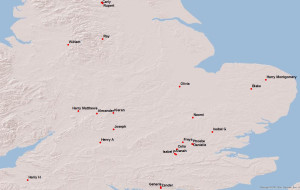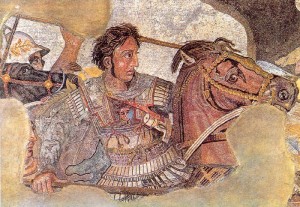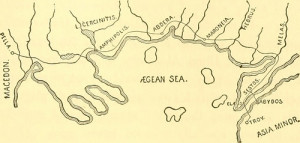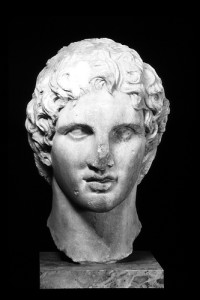Maps produced using GIS software
Click on the new page ‘Maps Produced’ in the menu bar above to see the five maps created by our students!
Olympus News on Prostration
A news report from Alexander’s camp!
Actually, a dramatic reconstruction by a Cambridge PhD student of a tense moment during Alexander’s campaign. The Persians Alexander has conquered have started prostrating themselves before him, just like they did for their old kings. Should Alexander’s Greek and Macedonian followers do the same, or is this a step too far? And what does Alexander mean by asking them to do it? Does he now think he’s a god, or is he just trying to please his Persian subjects?
Did Alexander Deserve the Title “Great”?
Few people in world history have been as famous as Alexander. He was revered in the ancient Mediterranean and in the Middle Ages as not only a great ruler, but also a wise one, companion of both generals and philosophers. In Iran he was reviled as the greatest enemy of Persia and of the Zoroastrian religion. But does he deserve the title of “the Great”? It is a title bestowed on very few rulers
If you had to decide what criteria to use in deciding whether a king was great or not, what would you use? Would you want a great military leader, who expanded his country’s power; a protector of his people; a wise administrator and judge? Queen Elizabeth I was some of these things, but has not been given the title; but Alfred has.
If you had to decide whether to award it to Alexander, how many of these pros and cons would you consider important? These were the ones our students came up with.
For – His achievements were above average – no other king in history has conquered so much territory and in so short a time
Against – Those achievements disintegrated very quickly. Arguably, his legacy was not great.
For – The Empire was his own creation and no-one else’s. He was great, and what his successors did doesn’t matter.
Against – Alexander was a Bad Man, with a thirst for conquest, who brooked little opposition, was bad-tempered and even destroyed some of his own followers.
For – It was his men who gave up; they were not as great as him.
Against – He used the Persian Wars in the fifth century BC as an excuse. What he was after was conquest and his own glory.
For – He was an ambitious man. He sincerely believed that he was the son of Zeus; and because of this, he felt he had a responsibility to do great things.
Against – Persians have an historical memory of Alexander quite different from the West’s. They call him “the Accursed” and accuse him of destroying their ancient greatness and culture, and inflicting foreign rule. The Zoroastrians remember him as the man who destroyed much of their ancient religion.
For – But the Persians did the same thing to other peoples, including the Greeks. Alexander and his men regarded their war as revenge for Persian campaigns against Greek. In addition, Greek cities in modern Turkey and the Egyptians were liberated from Persian rule.
Against – If Alexander wasn’t able to inspire his men to complete the conquest of India, he can’t be regarded as a great leader. And he, like the Persians, was guilty of enslaving others, including Tyre and Thebes; and destroyed his enemies.
19-20 August
The Alexander the Great Holiday History Camp starts tomorrow! We’re looking forward to meeting you all.




Recent Comments